As pointed out in Part 1, objectification need not only be sexual or punitive in nature. Some factors, including Luigi’s inability to communicate and impart his views, have increased the public’s attachment and objectification of him in an almost religious way. Hackley and Hackley1 describe these one-sided relationships as serious and central to fans’ lives. Parasocial attachment, “a one-way relationship resulting from a false sense of intimacy created during media consumption,”2 is typically normal and sometimes even beneficial, specifically for adolescents and children when developing their identities.3 Parasocial attachment veers into celebrity worship territory when fans develop “a form of almost obsessional involvement where individuals idolize their favourite celebrity to the point of ‘worship.’”4 Commonly, celebrity worship involves their exaltation to the level of a deity and includes extreme psychological attachment, centering said celebrity as the main character of one’s life, an intense devotion to and identification with them, and a loyal fanbase who is willing to invest time and resources.5
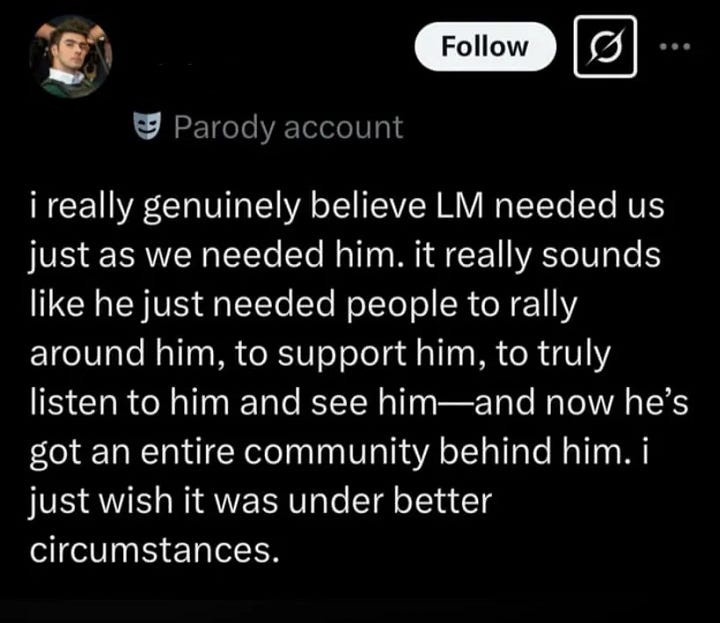
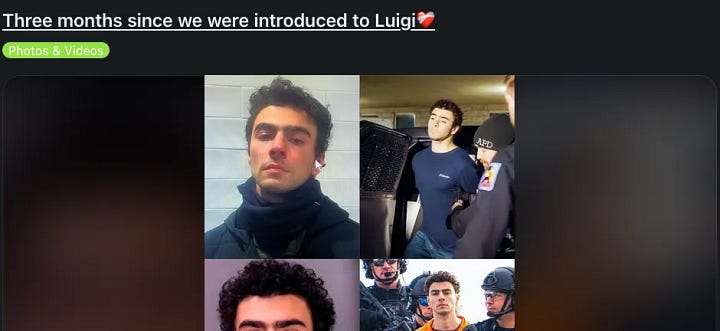
r/FreeLuigi and other communities tied to it tend to promote different levels of celebrity worship. Of course, Luigi is a different type of celebrity. One that has not been seen in the public consciousness for possibly at least a century. Luigimania features a specific subset of people who make up many of the online forums. If one separates the Luigi worshippers (the most blatantly obvious of devotees) from the supporters and the fanatics, one can easily infer that the fascination with Luigi partly lies in the fact that no one can be corrected on their assumptions about his character. Therefore, the public has reduced him to an object and used his essence exactly as they wish. This type of objectification can be best described in tandem with Nussbaum’s 7-factor framework:6
Instrumentality: The objectifier treats the object as a tool for his or her purposes.
Denial of autonomy: The objectifier treats the object as lacking in autonomy and self-determination.
Inertness: The objectifier treats the object as lacking in agency, and perhaps also in activity.
Fungibility: The objectifier treats the object as interchangeable (a) with other objects of the same type, and/or (b) with objects of other types.
Violability: The objectifier treats the object as lacking in boundary-integrity, as something that it is permissible to break up, smash, break into.
Ownership: The objectifier treats the object as something that is owned by another, can be bought or sold, etc.
Denial of subjectivity: The objectifier treats the object as something whose experience and feelings (if any) need not be taken into account.
She explains that not all objects must fit every category, however multiple categories interact within one object. With Luigi, objectification, in some instances, is denoted by his current absence of autonomy, as well as inertness and subjectivity. What Nussbaum describes as “spiritual violation,” or “denial of control” over his self-defining aspects as a human, is a specific violation that has occurred with fans. Using Nussbaum’s framework, one could find several factors that some in the community have engaged in to idolize Luigi:
Denial of autonomy: Luigi is treated as something, not someone, and is used as one chooses, without his active participation or consent.
Inertness: Luigi is denied the dignity of agency and self-determination
Ownership: Luigi is commodified without his explicit consent. This results as being valued only as a means to an end.
Denial of subjectivity: Luigi is used in a way that disregards his feelings and experiences; his distinctly human (non-inanimate) qualities.
In this way, the fanatics engage in daily objectification of Luigi in the form of idolization, regardless of erotic intent. Again, because Luigi cannot speak for himself—he is treated in such a way that he only exists as a tool for use by the fanatics, disrespecting his humanity. At the cost of his autonomy, Luigi is then regarded as something “to be handled, to be managed, to be cured, to be trained (…) something to be looked at, to be pursued, to be consumed, to be used, to be possessed.”7 And, while Luigi is not physically owned by his fandom, they do seem to feel some sort of entitlement to protect him from what they perceive to be threats to his image at all costs—even if that cost is by way of destroying Luigi’s self-determination. This can take the form of exploitative documentaries but also in the fandom who has presented him as an ultimately flawless, childlike, clean, and pure victim of the punitive system. Luigi’s image fits neatly within the Madonna/whore complex. (Which, to be honest, I hope would give him a laugh.) Others have criticized the fandom of infantilizing Luigi; however, it’s simply another aspect of objectification, regardless of how Luigi may or may not feel about their speculation. Even Gurwinder Bhogal, a blogger that Luigi spoke with before going off the grid, quoted him in an article about their conversation: “Luigi lamented what he called ‘a lack of free-will’ in Japan (…) I quickly realized that agency was a major concern of Luigi’s.”8 Say what you will about Bhogal, but he documented proof that autonomy and self-determination was a big deal to Luigi. Right now Luigi has so little control over how his story is told or who tells it, to remove what little agency he has in the name of “protection” is to ultimately deny him of his right to humanity; his freedom to make his own decisions and mistakes; the basic rights we take for granted outside of the carceral system.
The irony of this type of objectification is that Luigi has indicated in past social media posts that he is quite concerned about succumbing to tribalism and embraces unity across different social strata. Yet, the Luigi fandom, albeit not all or even possibly the majority of his supporters, tend to prevail in online spaces as they shout the loudest. One example, which may be the most known within the fandom, is the Holli letter. The story goes like this, for the uninitiated: a supporter (Holli) wrote to Luigi and posted his response publicly on her TikTok account. Luigi’s writing style in this response was one that the fandom was not familiar with and no doubt stirred up resentment as it did not fit the fantasy they have developed about him. He was more nonchalant; dorky, even. He even made a joke pertaining to his initial arrest (“Picked up at McDonald’s for the heinous crime of ordering a hashbrown.”) The letter was cringe in the most charming way and demonstrated his authentic self.
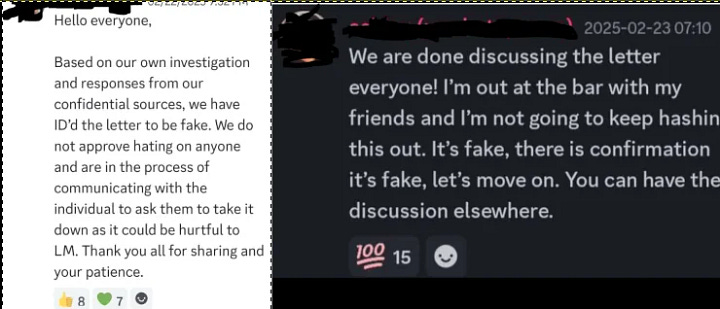
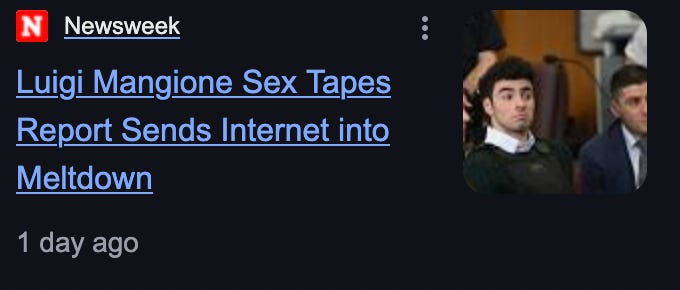
This resulted in moderators in r/FreeLuigi and related Discord communities announced that the letter was fake, though without providing any proof of their claims. This caused a snowball effect of users in the fan communities to then take to TikTok to bully Holli as well as report other videos containing the letter, as they were directed by some moderators to report the videos. She became a target. The bullying and overreaction by the community resulted in the Streisand effect: the tabloid Daily Mail wrote an article about the letter, and readers unrelated to the Luigi fandom began to bully Holli even more viciously. Holli’s letter was eventually proven to be real with Luigi’s received mail catalogue. Luigi fanatics blame the Daily Mail article on Holli to this day. While it was under the guise of protecting his innocence, it’s my belief that the community just did not like Luigi’s authenticity. It didn’t match what they imagine about him.

This example demonstrates the mob mentality of the fandom community; a consequence of their objectification of Luigi and sense of entitlement regarding a living, breathing human being. r/FreeLuigi and communities like it have taken ownership of his image and spoken on behalf of him in ways that do not always reflect what his online trail demonstrates concerning his ethics and values. He laid it all out there for anyone to see! There is now a divide in the community and needless drama, when collectivism is most needed to help a man who is facing the death penalty. Petty accusations and drama are rife on the social media platforms, rather than a collaborative process to engage in activism. Virtue signaling has prevailed, while collective efforts that might have a true positive effect on the carceral system and in legislature have been ignored. Because online communities and BBSs are hierarchical in nature, it goes against the nature of collective activism, and forums such as this have positioned themselves as gatekeepers of information. Though his legal team states clearly that they are the only spokespeople for Luigi, mods at r/FreeLuigi center themselves in his case as self-appointed arbiters of truth. Countless times moderators on this forum have chosen to disburse incorrect information regarding the authenticity of letters or the veracity of gossip mentioned elsewhere on Reddit. Some attempts are made to regulate behavior outside of Reddit or Discord, though they have no authority to do so. Sources are kept secret, transparency is ignored, and, as demonstrated, bullying happens as a result of misinformation. The moderators take no accountability for these multiple “scandals” and prefer to close any means of open communication about these incidents.
“I hate a bitch hating on a bitch and they both hoes.”
- Kendrick Lamar, tv off
Let’s forget the drama and those who want to reinforce hierarchal structures within the movement. The central question is how do we come together to create significant change in the healthcare and prison industrial complexes?
I’ll touch on that in the third and final part of this series: Part 3: I’ll Meet You In The Streets. Subscribe to be alerted when it’s posted.

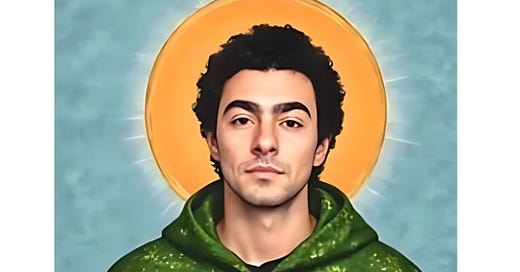



The Kendrick Lamar quote was chefs kiss
Im writing an article ever so slightly similar too:) ignore the haters i havent read the whole thing even but i already know thats not what you’re talking about. Ppl r selectively ignorant